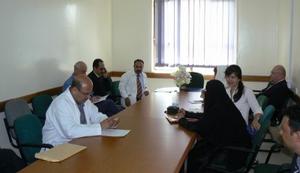Nuclear mattersWikiLeaks: Yemen radioactive stocks "easy al-Qaeda target"
Yemeni official told U.S. diplomats that the lone sentry standing watch at Yemen’s national atomic energy commission (NAEC) storage facility had been removed from his post, and that the facility’s only closed circuit TV security camera had broken down six months previously and was never fixed; “Very little now stands between the bad guys and Yemen’s nuclear material,” the official warned, in a cable dated 9 January this year sent from the Sana’a embassy to the CIA, the FBI, and the department of homeland security; when told of the Yemeni nuclear storage problem, Matthew Bunn, a Harvard University nuclear terrorism expert, said: “Holy cow. That’s a big source. If dispersed by terrorists it could make a very nasty dirty bomb capable of contaminating a wide area”

Meeting of Yemen's NAEC // Source: iaea.org
A senior government official in Yemen warned U.S. diplomats that poor security at the country’s main store of radioactive products could allow dangerous material to fall into the hands of terrorists, according to a leaked U.S. embassy cable.
The official told the Americans that the lone guard standing watch at Yemen’s national atomic energy commission (NAEC) facility had been removed from his post and that its only closed circuit TV security camera had broken down six months previously and was never fixed.
“Very little now stands between the bad guys and Yemen’s nuclear material,” the official warned, in a cable dated 9 January this year sent from the Sana’a embassy to the CIA, the FBI, and the department of homeland security as well as the U.S. secretary of state in Washington and others.
Yemen, the Arab world’s poorest nation, has emerged as al Qaeda’s most active base, after Iraq and Afghanistan. It is home to Al Qaeda in the Arab Peninsula (AQAP), the group behind a series of attacks on western targets, including the failed airline cargo bomb plot in October and the attempt to bring down a U.S. passenger jet over Detroit on Christmas Day last year. The Nigerian-born Detroit bomber, Umar Farouk Abdulmutallab, was radicalised in Yemen, according to security sources.
The Guardian reports that the cable, classified as secret by the U.S. ambassador Stephen Seche, and sent during the immediate aftermath of the Christmas Day bomb, describes how the “worried” official implored the U.S. to help convince the Yemen government “to remove all materials from the country until they can be better secured, or immediately improve security measures at the NAEC facility.”
The cable revealed that the facility holds large quantities of radioactive material used by hospitals, local universities for agricultural research and in oilfields. The international community fears radioactive isotopes could be used to make a dirty bomb — a device combining simple explosives with radioactive materials, which it would disperse over a wide area.
The isotopes are not explosive themselves, unlike nuclear material such as uranium. Although unlikely to kill a large number of people, such a device could cause tremendous damage and disruption by creating large no-go areas contaminated by radioactivity.
International experts said today the lack of security at the Yemen facility would be a “high priority” for the U.S. government. Told of the cable’s revelation of the type of materials and the amount stored in Yemen’s NAEC facility, Matthew
